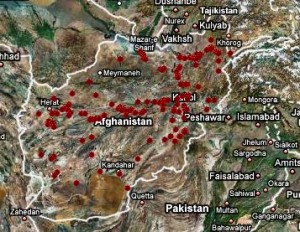A new GRAIN Briefing is scathing about current efforts to “rebuild” agriculture in Afghanistan. It alleges that these are taking place with little or no reference to the “rich heritage of farmers’ varieties.” 1 First, seed aid is coming entirely from outside.
According to an ICARDA survey conducted in 2002, neither rain-fed rice varieties nor rain-fed and irrigated wheat varieties that have been supplied by the aid organisations have included any Afghan genetic materials. The authors of the survey concluded that Afghan wheat farmers are “on their own when it comes to replicating and reselecting local variety seedâ€. 2
Not that genetic material from Afghanistan is lacking. Here’s what SINGER knows about barley and wheat material from that country maintained by ICARDA 3:
The problem was supposed to be addressed through a code of conduct for seed aid, which came out in 2002. But this has apparently been undercut by efforts to build up a local private seed industry heavily subsidized by the US Army and other donors and based on
…laws that make proprietary seed sale the norm, forcing farmers to buy rather than save or share such seeds, with little protection for farmers’ own local varieties and seed practices. 4 Thus, on 13 September 2005, by way of a process led by the FAO and the EU, the Agriculture Ministry adopted a National Seeds Policy which, while seeming to defend the seed-saving rights of farmers, endorsed monopoly rights for seed companies that would make it illegal for farmers to exchange or sell commercial seeds:
“Farmers will maintain their right to use, exchange, share or sell their farm-saved seed between themselves without any restriction and will have the right to continue using any varieties of their choice without being hampered by the system of compulsory registration provided they do not commercialise production emanating from proprietary varieties.” 5
The alternative to this is for farmers to turn to the seed supply networks run by the Taliban. The paper doesn’t say if the Taliban supply local varieties, but
[e]ither way — Taliban seed or US Army seed — the seed is certainly not “free”. Both come with heavy political agendas, backed by armed forces, that have little to do with the interests of Afghanistan’s small farmers. Getting their own seeds back into the hands of these farmers is the only real way that they will find their freedom.
While none of this is particularly surprising, the paper overall does seem a little unbalanced. There is nothing in it about what ICARDA and the other IARCs have been doing more recently, and not just in terms of seed relief but also crop improvement. 6 And of course ex situ conservation of Afghani genetic resources. It will be interesting to see how the CGIAR, FAO, USAID and others reply to this latest blast from Barcelona. If they reply at all.
- Including, alas, of the opium poppy. But I’m not going to go there on this occasion, though GRAIN does.
- J. Dennis, A. Diab and P. Trutmann, “The Planning of Emergency Seed Supply for Afghanistan in 2002 and Beyond”, a draft concept paper prepared for the Tashkent Conference, 2002, http://www.afghanseed.org.
- Added later: I should have pointed out that this obviously only shows the material which has been geo-referenced. Total holdings from Afghanistan are more extensive.
- GRAIN, “Seed laws: imposing agricultural apartheid“, Seedling, June 2005.
- National Seeds Policy of Islamic Republic of Afghanistan, 2005.
- There may be a reason for that. I wasn’t able to find out much myself, though admittedly I didn’t really try very hard.
